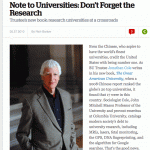BU Today | Note to Universities: Don’t Forget the Research
 Note to Universities: Don’t Forget the Research
Note to Universities: Don’t Forget the Research
Trustee’s new book: research universities at a crossroads
Even the Chinese, who aspire to have the world’s finest universities, credit the United States with being number one. As BU Trustee Jonathan Cole writes in his new book, The Great American University, when a 2008 Chinese report ranked the globe’s 20 top universities, it found that 17 were in this country. Sociologist Cole, John Mitchell Mason Professor of the University and provost emeritus at Columbia University, catalogs modern society’s debt to university research, including MRIs, lasers, fetal monitoring, the GPS, DNA fingerprinting, and the algorithm for Google searches. That’s the good news.
The bad news, he warns, is that our universities could be in big trouble. Cole worries about recession-induced shrinkage of government funding and a staggering chasm between the richest schools and the rest, which makes recruiting top research faculty daunting for all but the wealthiest. Other nations’ universities catching up to ours would not be bad, says Cole, but letting our own wither would be terrible. BU Today talked with Cole about his vision of the future of education.
BU Today: What made you write this book?
Cole: We in our great universities had done a poor job at communicating with the educated public about these universities and what they have achieved. Most graduates think about undergraduate education, their own education, how knowledge is transferred to young people. That’s important. However, very few know the discoveries that come out of these universities — the medical miracles and devices. I wanted to fill a void in the history of American higher education.
You embrace a seeming contradiction: we must support our research universities, yet it’s OK if other nations surpass us.
All that their rise will do is expand the pool of great universities. If we compete well, we will be a smaller share of a bigger set of great universities. This will be good for us and great for the growth of knowledge. We will solve critical problems more rapidly because of this competition.
Our universities may be better than those of other countries, but factoring in nonuniversity research, is American research really better?
If you look at the European scene, you’ll see a great deal of productivity in science and engineering through institutes. That does fill some of the gap. Structurally, they’re not in as good a position as Americans, who have dominated, for example, the Nobel recipients. The absence of links between education and students and research in the same organizational setting is an impediment.
Now, you really can’t compare the United States and its production of new knowledge to Germany or France, which are much smaller. Also, while there is relatively limited collaboration between institutions around the world, there has been growing collaboration between individual scholars around the world.
Wealthy universities poaching the best research talent from poorer ones could devastate the losers, but why would it hurt the country?
Competition pushes many universities to expand facilities and the conditions required for highly productive research, like the laboratory BU is trying to put up for infectious diseases [NEIDL]. It also expands the base of knowledge. The other thing is that competition leads to the creation of new fields.
Absent that competition, where poorer universities become farm systems for four or five institutions, that is going to lessen the necessary push at the frontier of knowledge, and the growth of knowledge will slow down. There’s been talk at a lot of universities that science and engineering have become so expensive that we can’t afford to compete. Is that good for America? I don’t think so. When you get to Britain, where you have just two major universities, I think it becomes a threat to the system.
You criticize “short-sighted state legislators” for cutting aid to public universities. But in the worst economy since the Depression, what should they cut instead?
It’s not an easy problem, but there are choices to be made. California has built arguably the greatest system of public education ever in the world. But when California spends more money on its prisons and incarceration because of three-strikes-and-you’re-out, that’s a choice.
When they make great universities noncompetitive, there’s a cascading effect that hurts the California economy and the nation as a whole. Berkeley salaries for full professors are about 75 percent of a full professor at Harvard. Once the top professors leave, the best students who want to study with them leave. The discoveries are gone. Money from the National Science Foundation and the National Institutes of Health is gone. It’s a multiplier effect. The state is losing from its disinvestment. One isn’t trying to argue a university should take every dollar that’s discretionary, but legislators are going to have to raise taxes.
How do you balance your BU responsibilities and your day job?
My day job consumes most of my time. It’s not as if BU takes up huge amounts of time. I find it enjoyable to be a trustee. They’re an exceptional group of people. Bob Brown, as a president, is unusual. He is interested in trustees being more involved.
Rich Barlow can be reached at barlowr@bu.edu.
Posted by admin | 0 comments